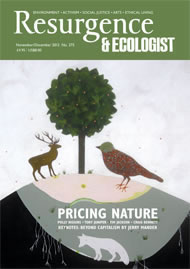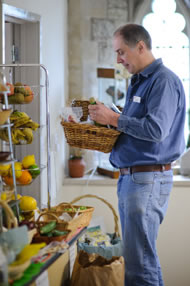The United Nations International Year of Co-operatives 2012 has been a tremendous opportunity to share the cooperative success story with a world that is often unaware of its very existence. The cooperative sector is the world’s ninth-largest economy. It has 1 billion members. And, my favourite statistic, it employs 10% more people than all the multinationals and their subsidiaries put together.
Such proclamations are important. But they cannot by themselves do what needs to be done. We need to establish not just size, but relevance as well.
Twenty years ago, rural communities said ‘enough is enough’. A handful of pioneers saw that nothing would stop the continual loss of rural services, such as shops and pubs, except their own actions. So they started to turn those services into cooperatives. They are now at the vanguard of ensuring the survival of vibrant rural communities.
Across the UK, 282 communities now run their village shops as cooperatives. It is an incredibly sustainable model, with only 13 failing in those twenty years, and a model that is far more resilient than just about any other form of enterprise.
The commitment of these 282 communities as cooperative members far outstrips those of their older cousins. They not only trade with their cooperatives, but they also invest their own money to create them, often using community shares as their main form of investment. In many cases, the shops are reliant on volunteers. Across the UK, 1.2 million hours of volunteering go into community shops (compared to 1 million hours donated to, for example, the RSPB).
Often operating out of small premises, many running without previous retail experience shops that failed in the private sector, with catchment areas way below what commercial operators would accept, these cooperatives demonstrate just what co-operation can do. Last year their like-with-like sales growth outstripped every single major retailer in the UK.
Their secret lies in the fact that they do not seek commercial success for its own sake. Their passion is to provide a service for their whole community in a shop owned by their community. And perhaps the greatest sign that they had become the accepted way for rural communities to tackle their loss of shops came in 2010 when 800,000 people listened in every day to the residents of Ambridge saving their village shop by forming a cooperative in The Archers, Britain’s longest-running radio soap opera.
This form of retailing doesn’t take a lack of traditional land for development as a barrier. Lodsworth in Sussex pays 1p rent a year to site its beautiful wooden store in the pub car park. Lanreath in Cornwall developed its successful store in the village toilet (bringing a whole new meaning to ‘convenience store’). Exbourne in Devon, denied the chance to build up, built down and created an underground shop.
If shops are the flagship of this rural revolution, they are certainly not the only member of the fleet. In essence, there would appear to be no aspect of rural life that doesn’t lend itself to a cooperative solution. The loss of village pubs has led to an increasing number of villages choosing to own their own local, and even in the volatile world of pub ownership not one has failed so far.
The rethinking of traditional uses of rural buildings has gone as far as challenging the assumption that the church is a building used for just two hours on a Sunday. Yarpole in Herefordshire created its village shop and café in the church, whilst Shipbourne in Kent holds its farmers’ market between the pews.
Even farming – for so long a bastion of individual ownership – flourishes with this cooperative approach. Fordhall Farm in Shropshire was saved when 8,000 people came forward to buy it, leaving tenant farmers Charlotte and Ben Hollins to run the enterprise for the benefit of the whole community. And the services don’t have to be traditional ones. Alston in Cumbria is home to Cybermoor, a cooperative broadband service.
So why should these rural pioneers be celebrated by a movement with far larger enterprises as examples?
The simple answer is because they connect with the everyday lives of real people and inspire them to action. It is this ability that has attracted politicians to see them as a form of cooperative that is highly relevant today. In the last General Election, all three major parties expressed their support for cooperatives. What was telling was that only three examples appeared in all three parties’ documents: village shops, pubs and football clubs. Indeed, the supporters’ trust movement, which seeks to gain community control of football and other sports clubs, is a close relation of the rural shops. Both show that the cooperatives that attract the most attention are those that identify a problem people care enough about to act upon, and provide a cooperative solution ordinary people can then use.
The Plunkett Foundation was formed in 1919 by the pioneer of Irish agricultural co-operation, Sir Horace Plunkett. He and his circle of supporters had devised a method of developing cooperatives in Ireland far removed from the British approach. It placed greater emphasis on inspiring communities and then letting them choose which form of cooperative most suited their needs. It saw developing cooperatives as a team-based activity. In the late 19th century the Foundation developed around 1,000 cooperative enterprises in a population of 5 million.
This approach was revived during the UN International Year of Co-operatives, when the Plunkett family allowed its castle to be used by cooperative leaders from around the world to explore the role of rural cooperation in the future. Rural economies throughout the world benefit from a range of cooperatives. Agriculture, finance, retail, forestry, fishing, telecommunications, energy and many other needs are met. For instance, 70% of America is now served by rural electricity co-ops.
The scale of the cooperative movement matters. It is a sign of its success, built up generation by generation. But, more than this, its greatest strength lies in its ability to touch the lives of ordinary people and to inspire them with the message that, around the world, people like them, with the same hopes and fears, have managed to make their own lives better through co-operation. It is that ability that will continue to help make cooperatives even more relevant in the years to come.








